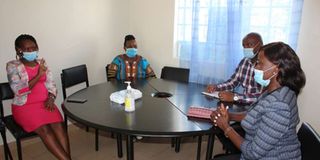No longer slaves: Addicts break alcoholism chains

From left: Dr Edith Kwobah (head of mental health-MTRH), Norah Jerotich and Sgt David Muchia (recovering addicts) and Dr Florence Jaguga, head of alcohol and drug use rehabilitation unit at MTRH, during an interview. STANLEY KIMUGE | NATION MEDIA GROUP
Like most young people, 13 was an age of curiosity for sergeant David Muchia and that was the first time he tasted alcohol.
He had picked the habit from his father, who struggled with addiction and other health complications.
In high school and even when he joined the Kenya Prisons Service in 2006, Muchia was experimenting with other drugs from miraa, marijuana, prescription drugs and even heroin. “I used to experiment with my father’s alcohol and it felt good and when I got a job, I became worse since I now had my own money. This affected my work. I missed work many times,” he recalls.
His health began to deteriorate and he spent days in and out of hospital. Muchia was diagnosed with severe gastritis and pancreatitis. The diagnoses marked his turning point. “I decided to change even though people discouraged me from going to a rehabilitation centre,” he says.
COST OF REHAB
Besides his health, he says he lost money, family and friends to the bottle. He recalls at some point he took a loan of Sh250,000 from a Sacco to finance his habit.
In 2017, the sergeant, who worked at Eldoret Main Prisons, made the decision to quit alcohol and spent four months in the rehabilitation unit at Moi Teaching and Referral Hospital (MTRH). “I didn’t know that addiction was a disease. But, rehab really changed me. I got my self-esteem back. I also regained my work skills,” he says.
Last year June, he was transferred and promoted to case manager and coordinator mental health and addiction programme for Central region in Nyeri, where he is reaching out to prison officers, their families and those serving their sentences. He also helps out schools, companies and the community.
The cost of rehabilitation in Kenya is out of reach for millions of Kenyans.
Dr Florence Jagagu, head of the alcohol and drugs rehabilitation unit at MTRH, says the hospital is one of three public health facilities, located in major towns, in the country that has a unit dedicated for rehabilitation, locking out many patients.
The bed space is also limited in most public facilities. For instance, the MTRH’s rehabilitation facility has 16 beds, 11 of which are for men. “More people are now acknowledging that addiction is an illness. Patients are seeking the service. However, they have to wait for months due to limited affordable facilities,” she says. “A solution to this would be to integrate addiction treatment into primary health care, so people can access it from where they are and this will also reduce the cost.”

Margaret Meja, who used to make illegal brew, at her home in Turbo, Uasin Gishu County. STANLEY KIMUGE | NATION MEDIA GROUP
The National Hospital Insurance Fund introduced a cover of up to Sh60, 000 for those seeking rehabilitation. In public hospitals, rehabilitation costs between Sh90,000 and Sh140,000. A patient in a private hospital has to part with between Sh200,000 and Sh300,000 or more.
The country has a shortage of psychologists and psychiatrists. An Auditor-General report showed there were 92 psychiatrists in public and private facilities while 41 psychologists in public and private facilities.
TRACKING REGISTERS
And in an effort to bridge this gap, in 2016, MTRH, Moi University through Ampath in a project supported by the Indiana University and Astoria Health Group started a community based programme to reach out to those battling alcoholism in Nandi and Turbo in Uasin Gishu County.
Dr Edith Kwobah, head of mental health department at MTRH, says the project was necessitated by a study conducted in Kosirai in Nandi County that established that 15 per cent of the population was affected by alcohol and drug abuse. “We established that not everyone can get to a rehabilitation centre because there is limited bed capacity in public hospitals and one has to wait for more than three months,” she says.
The programme entails the use of tracking registers by community health volunteers and psychologists reaching out to those affected by alcohol and substance abuse. “Although, we have not done a study on the impact of the programme, many lives have been changed,” she says, adding that they plan to expand the programme to more counties such as Bungoma and Trans Nzoia.
Shadrack Kipkosgei, one of the beneficiaries of the programme from Turbo, tells HealthyNation he struggled with alcohol addiction for 15 years.
FIGHT DISEASES
Kipkosgei later learnt about a community-based rehabilitation programme that promoted gradual reduction in alcohol use. “At the outreach, we were taught that one can gradually reduce the number glasses taken. For instance, I used to drink up to 12, but I reduced to eight then six and finally three,” explains Kipkosgei.
At Kampi Mapesa in Turbo, Margaret Meja, a former illicit brew trader, has also struggled, but won the battle against the bottle. She says she went into the illegal brew business after her husband died in 2005 in a bid to support her family.
Three years ago, through a Tumaini support group that brings together recovering alcohol and drug addicts, she started her journey to quit alcohol.
“I have become a more productive and responsible mother,” she says.
And as the world grapples with the Covid-19 pandemic, medical experts warn that alcohol and substance use can lower one’s ability to fight diseases. “In addition, when one is intoxicated it becomes hard to follow the measures put in place to curb Covid-19. Alcohol is also associated with acute respiratory distress syndrome and this is the end stage presentation of Covid-19,” says Dr Jagagu.



